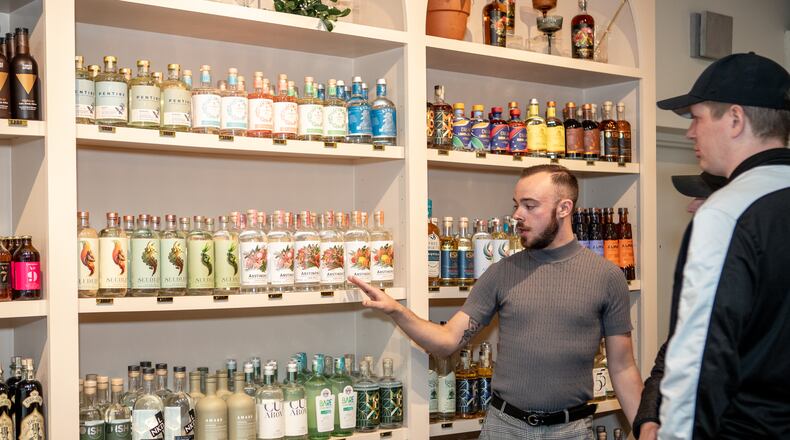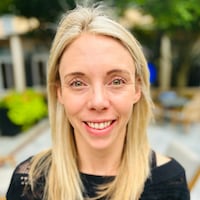Ten years ago, Johanna Sullivan, 54, of Sharpsburg got divorced and her mother died of cancer. She found herself relying too heavily on wine to cope. There was no rock-bottom moment. Nothing particularly terrible happened from drinking.
“It was more just a nagging sense, looming in the back of my mind, that I could be so much more if alcohol didn’t play a role in my life,” she said.
She was what popular culture calls “sober curious.” The term refers to individuals who are either interested in abstaining from alcohol entirely or actively shifting their lives closer to sobriety.
Sullivan didn’t identify as an alcoholic; 12-step programs or rehab seemed unnecessary. Yet, she tried to cut back on her own for several years without success.
“Our culture is so alcohol centric,” she said. “You use it for everything, right? When you’re happy, sad, mad, glad. It’s college football this weekend, or a baby shower, or client dinner. Everything revolves around alcohol, and it’s just so normalized that you’re expected to drink … Alcohol is so celebrated in our society, you have to explain yourself when you choose not to drink.”
In spite of the challenge, the day after Christmas 2019, she decided to try again. She found a dry January Facebook group and signed up, keeping her participation secret from her sober husband for fear of embarrassment if she wasn’t able to stick with it.
“I realized the group was all people that looked like people I would be friends with. They were normal people,” she said. “Nobody was in the gutter or anything like that. And I realized that you’re not alone.”
The benefits of not drinking became apparent almost immediately. Sullivan lost 12 pounds. Her complexion cleared up. She had more energy and found herself exercising and being active more often. She was sleeping better, was more productive and was saving a ton of money. An app on her phone helped her track how many calories and dollars she was saving.
“Dry January turned into dry February, and then I just kept going,” she said. “I never declared I’m an alcoholic to anybody. I never declared I’m stopping drinking forever.”
The term sober curious, Sullivan says, is helpful. It is less threatening and lowers the barrier to entry.
“It’s saying that you’re interested in learning,” she said. “I think that’s really important for someone that could be struggling in silence. It offers them an opportunity to investigate things without having to make a formal commitment.”
Experimenting makes seeking sobriety feel like a conscious choice, not a shameful admission.
Credit: Sundry Creative Studios
Credit: Sundry Creative Studios
Now, five years after quitting drinking, Sullivan runs a coaching business with her husband Rich Sullivan, who has been sober since 2012, called Clear and Present Strangers that helps clients with varying degrees of drinking habits to rethink their relationship to alcohol and readjust their lives to meet their goals. Johanna Sullivan also runs a Facebook group and Instagram channel called Sober Girl Gang.
“A lot of people focus on the things that they’re going to miss out on or that they’re going to lose instead of focusing on what they’re going to gain,” she said.
“A lot of people focus on the things that they're going to miss out on or that they're going to lose instead of focusing on what they're going to gain."
Jay Coates-Greathouse, 41, of Decatur, also started her sober curious journey in January nine years ago. For seven of those years, out of fear of the potential stigma, she kept her decision private, separated from her professional life in the mental health and wellness fields.
“Ten years ago, when you said you were sober, someone automatically assumed that you identify as an alcoholic, and that really put a lot of people into the closet, into the shadows,” she said. “Once I destigmatized it for myself, it was like, ‘No, sobriety is not something to be ashamed of.’”
Gradually, Coates-Greathouse became more comfortable with her choice to be sober and then, somewhat accidentally, began helping others when an herbal remedy she created for herself gained popularity among her friends.
“I realized that my social anxiety was actually related to the amount of drinking I was doing. So once I got sober, I started to notice that anxiety,” she said. “I developed a tincture in order to help. I started giving the tinctures out to friends.”
Encouraged by the positive feedback, she started hosting sober mixers. Then, two years ago, she started her company, Mystics & Mocktails, which hosts sober events, offers what she calls “conscious consumption coaching” and sells holistic products.
To be successful, she recommends building a community, getting a texting buddy, bringing your own zero-proof options to parties or picking social locations that have zero-proof options.
Credit: Michael Scaturro
Credit: Michael Scaturro
Providing a sober social space is what Aja Wolfe, owner of Sober Social, had in mind when she opened her speakeasy-style lounge inside the Koncept House in Castleberry Hill. Noticing that many of her girlfriends were reliant on alcohol to connect, she started hosting sober Sunday gatherings at her house where she taste-tested nonalcoholic cocktails.
At first, there weren’t many nonalcoholic spirits to work with and her friends poked fun at her for serving them juice. But eventually she started using Seedlip and other dealcoholized spirits like Monday Mezcal that even her most discerning friends couldn’t tell was zero-proof.
“My girlfriend was like, ‘You sure this ain’t got no alcohol in it?’ This has alcohol in it! I know it does!’ And I’m like, ‘No, it doesn’t,’” Wolfe recalls.
In the past five years or so, more options for zero-proof spirits from around the globe have become available. The market research firm Industry ARC projects global sales of zero-proof alcohol will reach $526 million by 2031. FactMR, another market researcher, calculated global sales of zero-proof alcohol options in 2022 to be $104.3 million with a projected growth rate of 10% until 2033.
Sober Social, which opened in 2023, also sells zero-proof cocktails infused with Delta derivatives for guests who want to avoid alcohol but still enjoy a mild relaxant. The Sober Social concept has been so successful, Wolfe started licensing her business. A Michigan location opens in March 2025, followed by locations in Florida and Colorado.
Credit: Jenni Girtman
Credit: Jenni Girtman
Atlanta has seen a proliferation of businesses catering to the sober curious. Soberish, a boutique bottle shop in Kirkwood, sells a mind-boggling selection of zero-proof spirits. There’s cucumber serrano vodka, fall ciders, aperol, vermouth, rum, tequila, mezcal, bourbon, whiskey and more — all with no alcohol content. There are products from Australia, Italy, Greece, the UAE, England, the U.S. and Japan.
Owner Mehrnush Saadat also carries a large selection of adaptogens like special mushrooms for cognitive focus, CBD and THC products. Soberish’s success in Kirkwood prompted Saadat to open a second location in Serenbe in November. Both locations host tasting events and socials.
In Glenwood Park, mixologist Austin McEwen has perfected the art of “sober crafting,” serving 11 zero-proof cocktails at Vesper Bar. The James Bond inspired bar was ahead of the curve when it came to the zero-proof game. It has featured a zero-proof menu since opening four years ago.
“We were tired of people having to drink club soda, or Shirley temples, or ice tea, or juice mix,” said Vesper’s founder and proprietor Damien McGee. “It’s just not fun and you feel like you’re an outsider.”
Credit: Danielle Charbonneau
Credit: Danielle Charbonneau
If one didn’t know better, the Vesper zero-proof menu could be mistaken for a typical cocktail menu with choices like a gimlet, sloe gin fizz, caipirinha, Negroni and old fashioned among other not-so classic options like a bonito (ritual 0-proof tequila, prickly pear, syrup, lime and ginger beer) or Paloma (ritual 0-proof aperitif, ritual tequila, grapefruit lime juice and simple syrup).
“We decided we were going to create a cocktail list that had real, beautiful ingredients, complex and interesting,” said McGee.
In addition to brick-and-mortar locales, Facebook and meetup groups like Sober Curious ATL and Sober and Active Atlanta promise sober social gatherings. And in the crowd at some concerts, fan groups with names like the Phellowship (for sober Phish fans), Digital Buddhas (for sober Disco Biscuit fans) and Wharf Rats (for sober Grateful Dead fans), carry yellow balloons and other insignia to help sober people find their tribe. Coachella music festival has a sober village called Soberchella, and Tennessee’s Bonnaroo festival has one called Soberoo.
While the motivation to abstain from alcohol varies from person-to-person, there appears to be enough people curious about sobriety to sustain an industry of alcohol-free options.
“It’s becoming normalized,” said Wolfe. “You don’t have to feel outed ... Even without alcohol you can loosen up, relax and have a conversation you’re going to remember tomorrow. And you don’t have to be like, ‘Oh my God, did I do that?’”
Correction: This story has been updated to correct the spelling of Jay Coates-Greathouse.
About the Author
Keep Reading
The Latest
Featured






